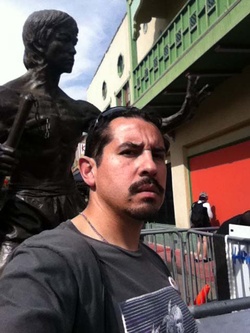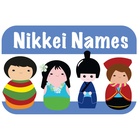My mother wanted to name me Nicolas, after her father. He died when she was still very young. My father was against it. He didn’t want any of the kids named after anyone in the family. He wanted all of us to have our own names. Being, that my dad is a junior, I’m sure the pressure of being named and following in grandfather’s footsteps must have weighed heavily on him.
My grandfather had been a Bracero during World War II, and he became a landowner. He was well loved in the town my dad was born in. My father was the only one of his brothers to venture to the United States from Mexico. I can feel in that decision my dad’s need to be his own person and more out of the shadow of my grandfather. My mother decided to name me Oscar Madrigal, it was the name of a popular singer during the ’60s.
My first name didn’t give me any problems growing up. Oscar, is a pretty easy name pronounce in English or Spanish. Madrigal, is a different story. I was raised in Watts, which at the time was about 80% African-American and only about 20% Latino. In many of my classes I was the only student that was not African-American.
I first learned my name in Spanish, and I would say it like this: MAH-DREE-GAAL. But in English it’s MAA-DRE-GAUL. Simple enough, yet my name was butchered throughout my life. When I was in 5th grade I learned that my last name had a meaning and where it came from. Madrigal is a type of song that has its roots in the renaissance. The Renaissance—Wow! My name was associated with the likes of Da Vinci and Michelangelo. I though it was pretty cool. I suddenly felt pride in my name and not the shame of mispronunciation.
I began to feel a little better about correcting people, almost a little cocky if you will. I figured there is a proper way to say my name in English and I can teach it to you. No excuses for my name to be butchered…it’s in the dictionary, I can show you the page. I could switch between the English and Spanish pronunciations of my name. It came with with ease. I used Spanish around Latinos, and when I just wanted to stand out a little more. I used the English pronunciation when I wanted to be a little more subdued and just kind of go hang in the crowd and not cause too much attention.
As I moved through life I really tried to be conscious of pronouncing people’s names correctly. In a diverse city like Los Angeles, I really wanted to make sure I could at least have the courtesy of giving that to someone. Armenian, Chinese, Japanese, Greek, French, whatever it was I wanted to try and make that effort. It came naturally almost, being that I was bilingual, I was used to making all kinds of sounds to pronounce strange sounds that go with one language, or another. I could sound just fluent enough when pronouncing someone’s name. I took French in high school and my teachers marveled at my pronunciation. Most romance languages and germanic languages I could tackle with relative ease.
The time came and I took my first Japanese course at UCLA. I sat there in my lab session and I was again the only Latino in my class. We went around introducing ourselves and hearing our Japanese pronunciations of our names. For most in the class, they had either Asian or English names and they were easily translated by the instructor. She got to me and had a little bit of a blank. She had not had to translate a Spanish name before. She also had not had to learn how to say Mexican-American in Japanese.
There I was in this class almost without an identity. I didn’t even want to get into how to translate Chicano into Japanese. That’s a whole other story and possibly a research paper on its own. It took her a few days, but she told me my name in Japanese. OSUKA would be my name for Oscar, easy enough, but my last name she told me could be MADORIGA or MADORIGARU. I had to choose. I chose the shorter one MADORIGA and so there it was, I became OSUKA MADORIGA, or MADORIGA-SAN.
My classmates at this point were just as curious about my name as I was and I became very popular in my class. “MADORIGA-SAN!” they would call our from the quad. They would call me to study, “Hey Madoriga-san, come study Nihon go with us.” It was a surreal experience, to spend my whole life reconciling how to teach people to say my name and now hearing a whole new way to say it. Not only that, but I learned how to write my name in hiragana.
So there it was, a new way to say my name, almost a whole new person. As my dad would have it, I had my own name, not following in the shadow of a family member. I was my own person and now with a Japanese version to go along.
* * * * *
This story was developed during the Nikkei Names workshop held at the Japanese American National Museum on June 28, 2014. For information about upcoming free Nikkei Names workshops, visit 5dn.org/names.
© 2014 Oscar Madrigal




